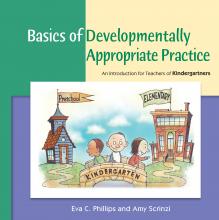Basics of Developmentally Appropriate Practice: An Introduction for Teachers of Kindergartners

About the Book
Exactly what you need to deepen your everyday practice in the kindergarten classroom! This book outlines how to apply the core ideas of developmentally appropriate practice, or DAP for short, in kindergarten.
This book discusses
- The core components of DAP
- Why play is an essential vehicle for learning during the kindergarten year
- The five key aspects of effective teaching that enact DAP principles
- The most frequently asked questions about developmentally appropriate practice in kindergarten
- An overview of learning and development for 5- and 6-year-olds
Whether you are a new or experienced kindergarten teacher, this book is for you.
Book Details
ISBN: 978-1-928896-97-5
Publish Date: 2013
Eva C. Phillips, EdD, is assistant professor at Winston-Salem State University and a former kindergarten teacher and coordinator for the Winston-Salem/Forsyth County School System in North Carolina. The coauthor of Basics of Developmentally Appropriate Practice: An Introduction for Teachers of Kindergartners, Eva also served as president of the North Carolina Association for the Education of Young Children from 2009 to 2013.

Amy Scrinzi, EdD, is a Race-to-the-Top Early Learning Challenge Grant Project Lead at the North Carolina Department of Public Instruction. A former classroom teacher, she has taught preschool through third grade.

Reviews
Amy Scrinzi and Eva Phillips have immersed themselves in kindergarten best practices for years. They now use their expertise and skills to illuminate the mindset, processes, and practices essential to make kindergarten a place where children truly learn and develop in appropriate ways.
—Sharon Ritchie, senior scientist, Frank Porter Graham Child Development Institute, University of North Carolina at Chapel Hill
While reading this book I was reminded time and time again of why I LOVE teaching kindergarten! This book supports kindergarten teachers’ efforts to create classroom environments where students develop a love and appreciation for learning, a sense of their competence and ability to make choices, and the sheer joy, wonder, and discovery that come with learning in the early years.
—Shakera Walker, senior manager, Teacher Leadership, and former kindergarten teacher, Boston Public Schools
